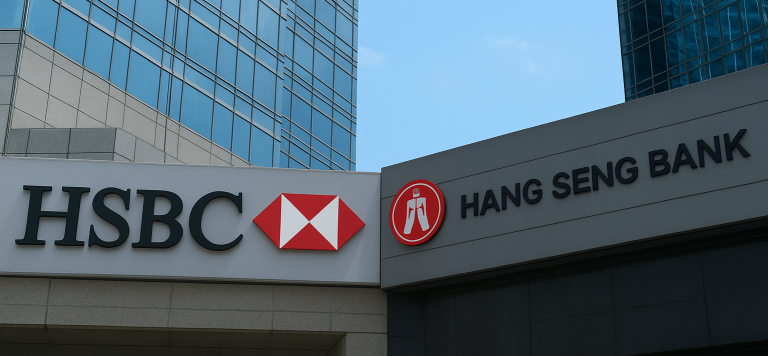Hang Seng Bank shares surged nearly 30% on Thursday after parent company HSBC Holdings Plc announced plans to take the lender private in a deal valuing it at more than HK$290 billion (over $37 billion).
Europe’s largest bank said it had asked Hang Seng Bank’s board to present a privatization proposal to shareholders through a scheme of arrangement under Hong Kong’s Companies Ordinance.
Under the plan, Hang Seng’s shares would be canceled in exchange for HK$155 apiece—about 33% above the stock’s 30-day average price of HK$116.5.
HSBC currently owns about 63% of Hang Seng Bank, putting the deal’s cost to minority shareholders at approximately HK$106 billion.
Shares of HSBC in Hong Kong fell more than 5% following the announcement.
Move highlights HSBC’s renewed commitment to Hong Kong
“Our offer is an exciting opportunity to grow both Hang Seng and HSBC,” Group Chief Executive Georges Elhedery said in a statement.
“We will preserve Hang Seng’s brand, heritage and customer proposition while investing to unlock new strengths in products, services and technology.”
Elhedery added that the transaction underscored HSBC’s confidence in Hong Kong’s status as a leading global financial hub and as a “super-connector” between global markets and mainland China.
HSBC said the offer allows for adjustments to reflect any dividends declared after the announcement date, excluding Hang Seng’s third interim dividend for 2025.
“One of HSBC’s strategic priorities is to grow in Hong Kong,” the lender said in its filing.
“We believe we are best positioned to do so by strengthening the Hong Kong banking presence of both HSBC Asia Pacific and Hang Seng Bank.”
Hang Seng Bank’s importance and recent challenges
Founded in 1933, Hang Seng is one of Hong Kong’s largest and most recognized financial institutions, serving around 4 million customers through its 250-plus branches and digital platforms.
The bank’s operations span wealth management, commercial and global banking, and include Hang Seng Bank (China) Ltd, which maintains branches in key mainland cities, as well as operations in Macau and Singapore.
As of end-2024, Hang Seng reported total assets of HK$1.8 trillion and a net profit of HK$18.4 billion, yielding a return on equity of 11.3%.
Its Common Equity Tier 1 (CET1) ratio stood at a robust 17.7%.
However, the lender has faced rising non-performing loans amid Hong Kong and mainland China’s deepening property downturn.
As of June 2025, impaired loans reached 6.7% of gross loans—up from 2.8% at the end of 2023—driven by commercial real estate exposure.
“Parent-subsidiary double listings are inherently problematic in terms of governance and in this sense it’s a positive and long-overdue move,” said Michael Makdad, senior analyst at Morningstar.
Despite these challenges, HSBC emphasized that its proposed buyout aims to strengthen long-term growth and technological integration while preserving Hang Seng’s local identity.
If approved, the transaction would mark one of the largest privatizations in Hong Kong’s financial history, signaling renewed faith in the city’s resilience as a regional banking powerhouse.
The post Hang Seng Bank shares surge 30% on HSBC bid to privatise in major HK buyout appeared first on Invezz

